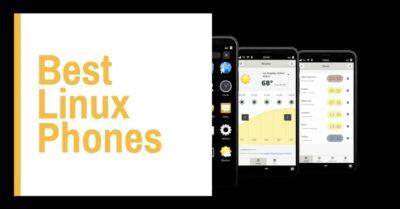5 Likes
2 Comments
#Weltherrschaft - es geht voran...
#librem5 #purism #phosh #MobileLinux #PureOS #PoweredByRSS
PureOS 10.3 UI and Camera – Purism
OK, dann testen wir das mal. Die Batterieleistung ist tatsächlich mit der größte Schwachpunkt. Gut, dass da weiter entwickelt wird.
#librem5 #purism #MobileLinux #GNU/Linux #PowerdByRSS
https://puri.sm/posts/librem-5-battery-life-improved-by-100/
Heute meine erste Session im Büro mit dem #Librem5 im #Convergence-Mode als vollwertiger #Gnome #Desktop.
Kurz an einen #Monitor angeklemmt und #Maus und #Tastatur via BT.
Das ging schon ganz gut.
Nach fast 4 Jahren Lieferzeit kam die Tage endlich mein #Librem5. Endlich LinuxMobile mit #Phosh!
Was soll ich sagen: Viel Licht und viel Schatten. Ich will aber hier erst mal nur auf einen Punkt eingehen: die #Convergence.
Anfangs hatte ich enorme Probleme. weil viele Tools nicht auf den kleinen Screen passen und elementare Steuerelemente nicht erreichbar sind. Das änderte sich schlagartig mit Anschaffung eines USB-C-Hubs, um daran Monitore anzuschliessen. Ein erster Test mit dem heimischen TV via #HDMI und Bluetooth-Tastatur war dann die Erleuchtung: das Librem5 schaltet dann in den Convergence-Mode und man hat quasi einen vollwertigen Desktop mit #Gnome. Das ändert (fast) alles, denn das Problem der wenigen nativen Apps wird geschickt umgangen und man kann die gewohnten Tools nutzen und kann mit echter Tastatur, Maus und großem Bildschirm arbeiten.
Eine erste Session war wirklich ermutigend.
Morgen kommt um 7:30 mein erster Post, vollständig mit dem Librem5 als Desktop verfasst - es geht um #Grubenwasser in #Bochum. Jedes Bit #LinuxMobile!
E4 - Production Run Complete, Shipping In Progress - 2019-04 - 2021-05
„Nach meiner Kenntnis … ist das sofort, unverzüglich“
Huch!
Bekommen dann auch all die Leute ihr Device noch geliefert, welches sie größtenteils vor Jahren als Unterstützer vorbestellt und bezahlt haben?!?
Ich frage für einen Freund...
https://www.golem.de/news/librem-5-purism-will-erstmals-geraete-frei-verkaufen-2207-166638.html

There are plenty of Linux phones to choose from out there. All kinds of options with different specs from different companies. Each Linux phone with its own unique set of features. In this article, we will guide you through buying the best Linux phone.
Essentially, if a smartphone is powered by a Linux OS, it’s a Linux phone. Technically, Android uses the Linux kernel too, but phones in this article also use FOSS software and modified Linux distros. Most phones here use the original (mainline) Linux kernel, not a heavily modified Linux kernel like Android uses.
Most of the Linux phones in this list use desktop-ready software. Convergence is the keyword here.
Most of the Linux phones here have a modular hardware design (easily replaceable parts) – although this is not a feature specific to Linux, it is a common feature among Linux phones.
Most Linux phones focus on privacy and security – just like most of the Linux desktop distros. Again, this is not a feature specific to Linux phones, but they do all focus more on privacy, so you might lose out on apps like Facebook and Google.
A key takeaway right now, though, is that most of these Linux phones can’t be used as a daily driver, and they can’t really replace your current daily driver. They do lack a lot of features and apps you’d need. They’re meant for developers and enthusiasts.
See https://linuxstans.com/linux-phone/
#technology #linux #mobile #librem5 #pinephone #fairphone
#Blog, ##linux, ##mobile, ##opensource, ##phones, ##technology
There are vastly more potent threats than this; for instance, if you buy their #librem5 and connect it to a network/carrier, your movements are tracked. https://puri.sm/posts/high-security-shipping-anti-interdiction-in-2021/
Purism’s #Librem5 Linux smartphone costs $1199 after the latest price hike • Tux Machines ⇨ http://www.tuxmachines.org/node/158147 #GNU #Linux #TuxMachines
Bonjour tout le monde, je suis #nouveauici. Mes centres d'intérêt sont #environnement, #purism, #Librem5, #debian, #antifa, #extinctionrebelionfrance, #linux et #opensource.
#Librem5 Getting Faster With Age ⚓ https://puri.sm/posts/librem-5-getting-faster-with-age/ ䷉ #purism #gnu #linux
Internet of Snitches - Purism ⚓ https://puri.sm/posts/internet-of-snitches/ ䷉ #purism #librem5 #freesw #pureos
#Librem5 support in mainline Linux • 𝗧𝘂𝘅 𝗠𝗮𝗰𝗵𝗶𝗻𝗲𝘀 ⇨ http://www.tuxmachines.org/node/154327 #GNU #Linux #TuxMachines
"Need to access your phone files, use a USB flash drive, USB cable, or transfer over WiFi. The post #Librem5 File Transfer appeared first on Purism." https://puri.sm/posts/librem-5-file-transfer/